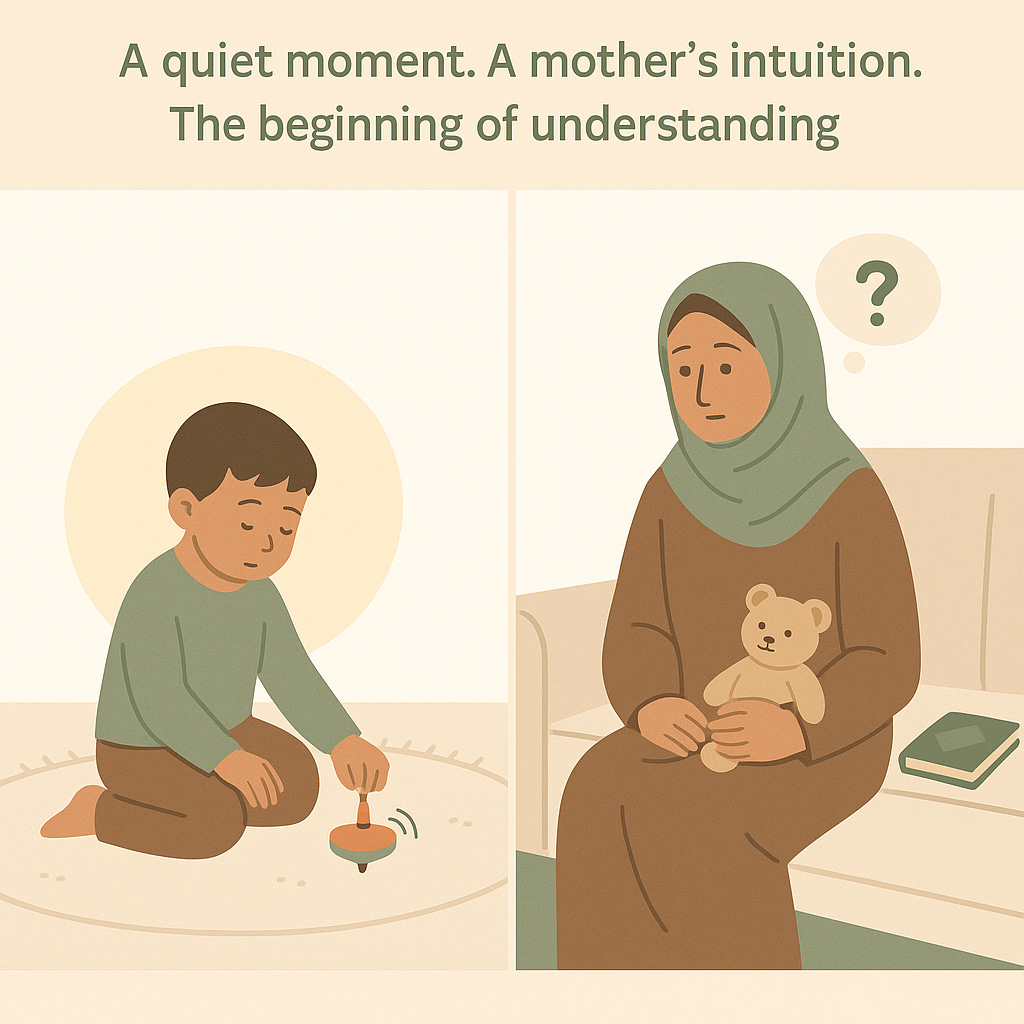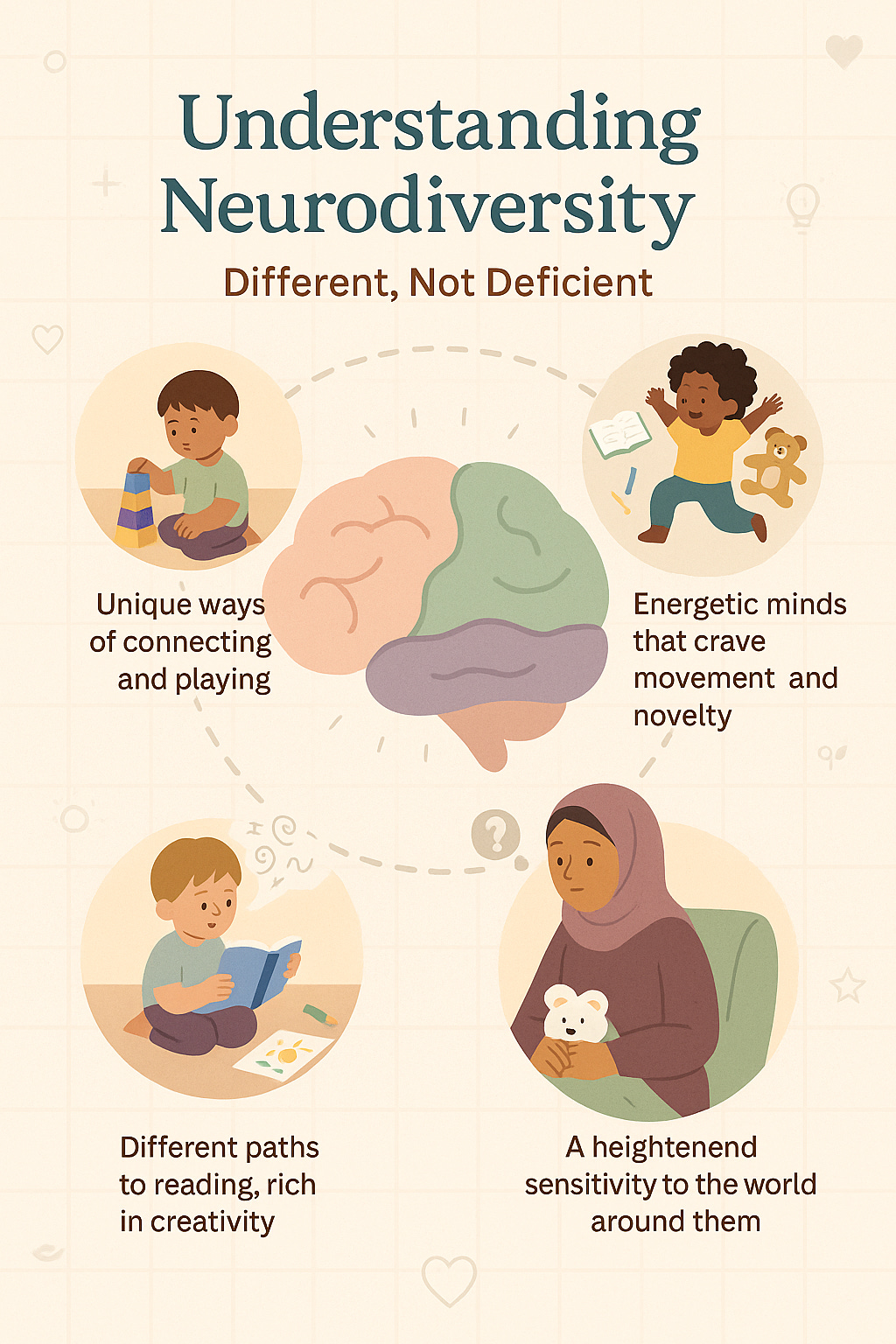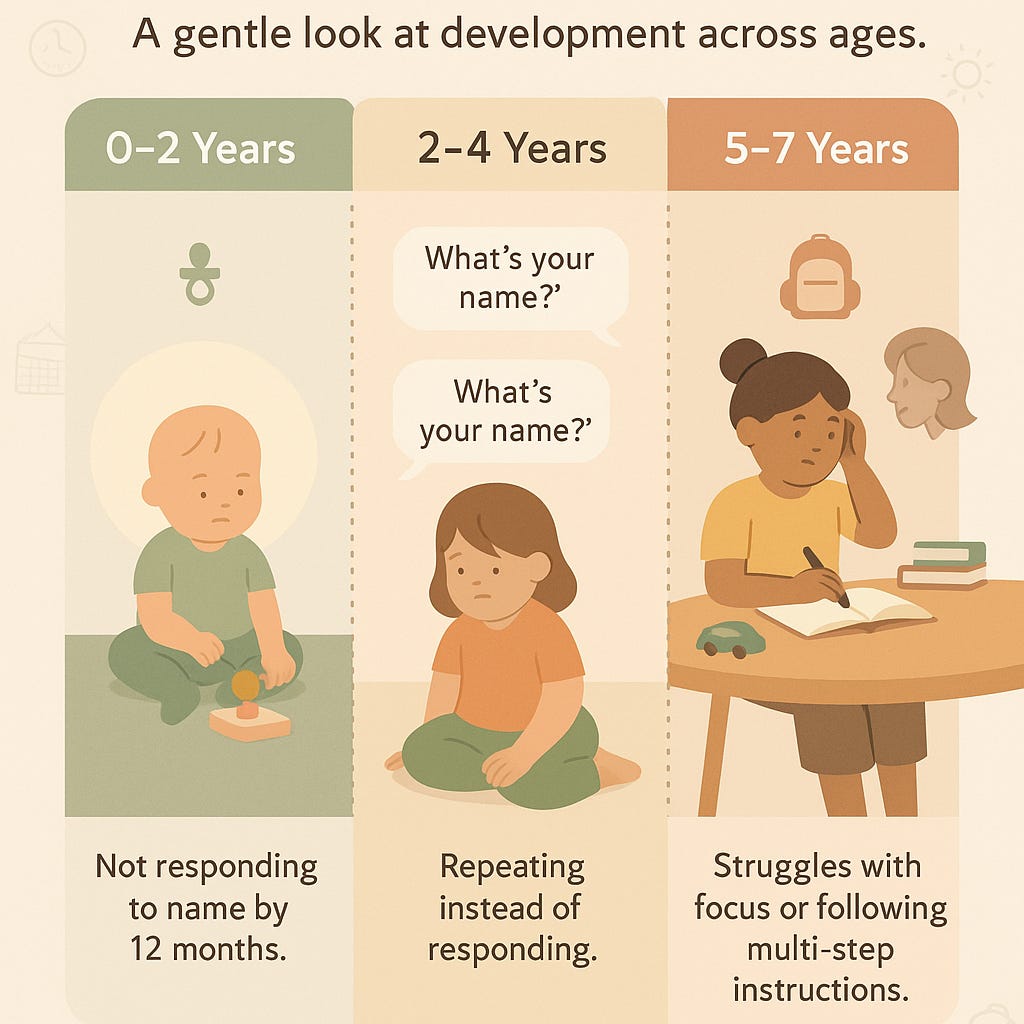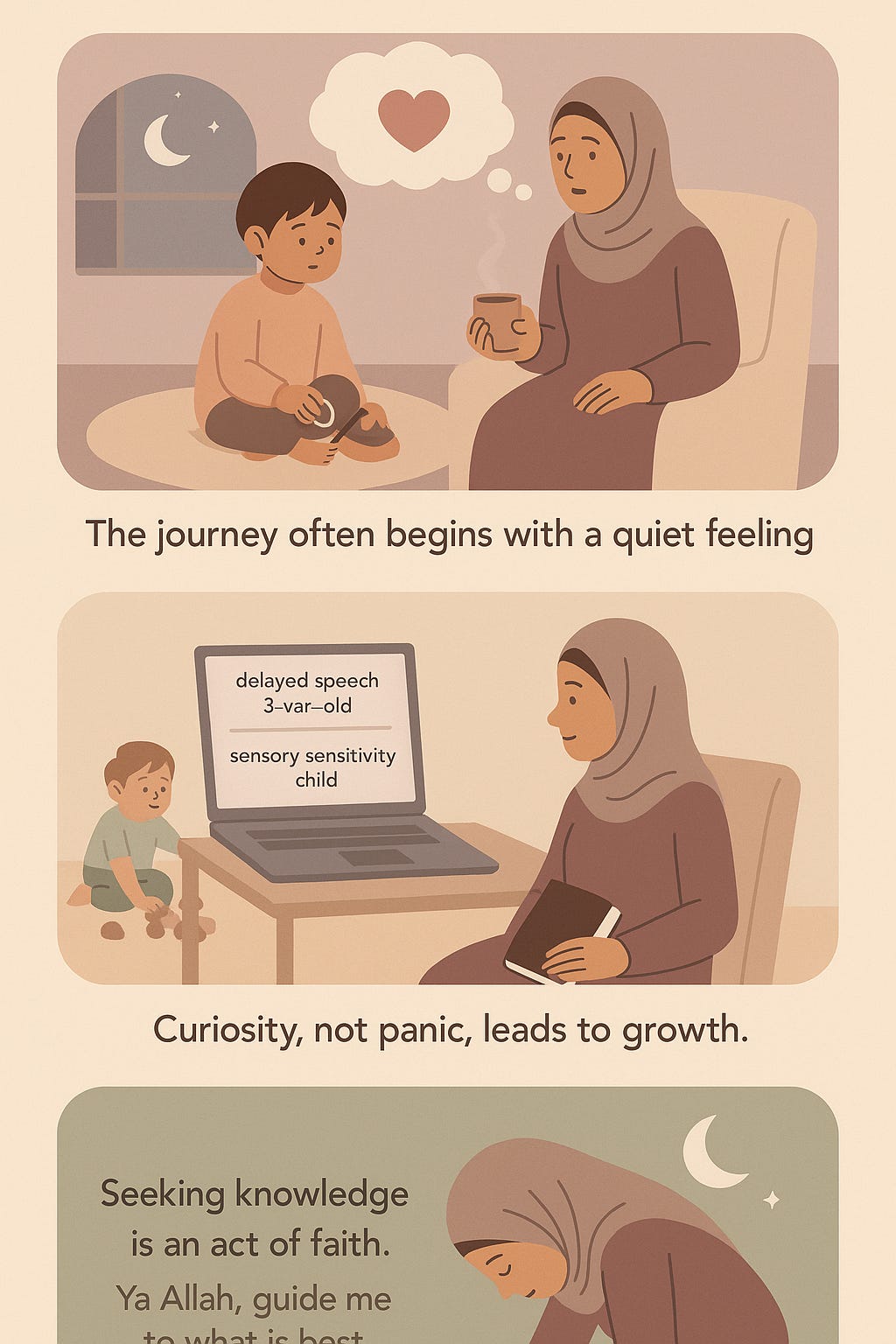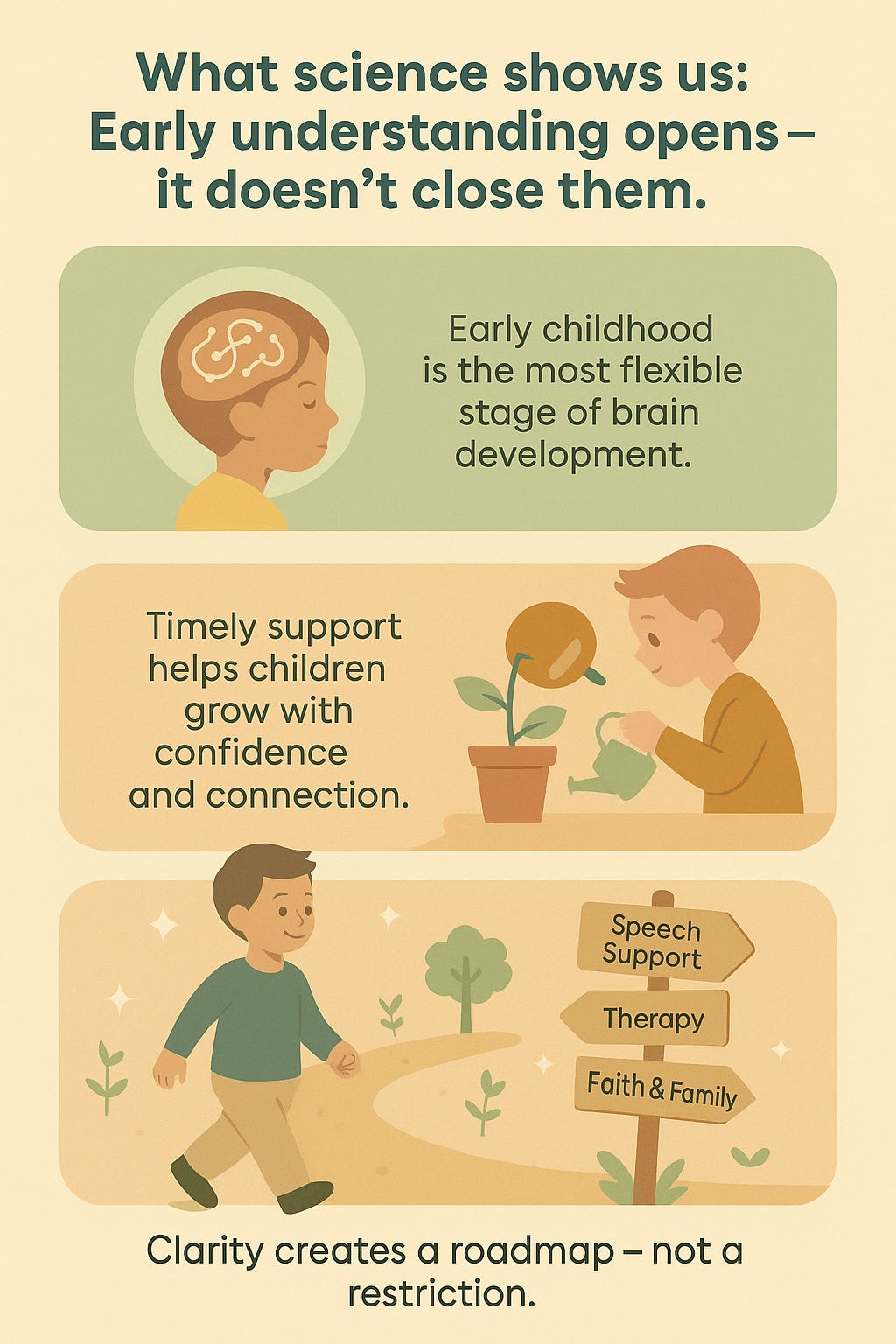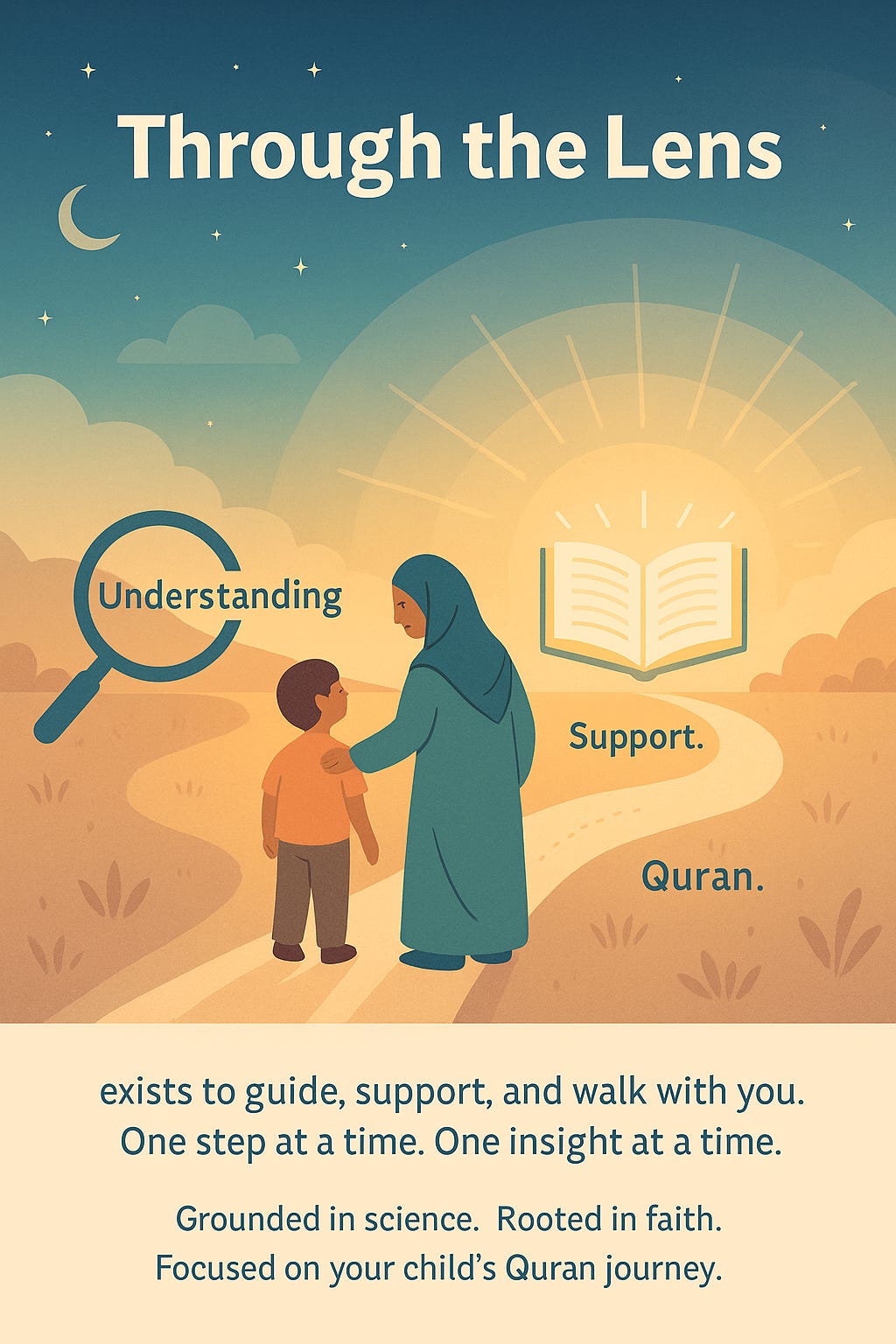Lens#9: Seeing Through the Lens: Understanding Your Child’s Unique Way of Being
A Research-Backed Guide for Muslim Parents to Recognize and Support Neurodiversity
Every parent knows their child in a way no one else can. You notice the way they line up their toys, how they avoid eye contact with strangers, or how a simple tag on a shirt can cause a meltdown. Sometimes, it’s just a passing thought—“Is this just a phase?” Other times, it lingers. Not as fear, but as quiet curiosity mixed with love.
This article isn’t here to label, diagnose, or define. It’s here to gently open a door. To help you see what you might already sense, with clarity, compassion, and support. Because at The Lens, we believe that understanding your child’s inner world—through both science and Islamic wisdom—is the beginning of truly guiding them toward a future full of faith, learning, and belonging.
1. Through a Mother's Eyes: When You Feel Something Before You Know It
Sometimes, parenting brings moments that tug quietly at your heart. Maybe you’ve noticed your child doesn’t respond to their name like others do, or they seem overwhelmed in noisy places, or they just prefer playing alone. These moments are small, yet they settle into your thoughts—especially when they don’t pass with time.
You might wonder silently:
Is my child just taking their own time?
Are they just a little different—or is there something more I need to understand?
Am I overthinking—or is my intuition gently telling me to look deeper?
Many Muslim parents carry these questions quietly. Often, we don’t talk about them—not because we don’t care, but because we don’t want to label, to worry too soon, or to seem ungrateful for the child we’ve been entrusted with.
But behind those silent questions lies something important: deep parental insight. And Islam teaches us to pay attention to the signs Allah places before us—whether they’re in the sky, in the Qur’an, or in our children.
This guide is here to support you through that journey of noticing. It doesn’t offer diagnosis or certainty. What it offers is clarity, compassion, and context—so you can understand the signs that may suggest your child sees the world a little differently. And that’s not something to fear. With love, knowledge, and guidance, differences can become doors—into new strengths, new ways of learning, and new kinds of connection.
2. Understanding Neurodiversity: Another Way of Being, Not a Mistake
Before we talk about signs and strategies, let’s begin with something that matters deeply: how we think about difference.
The word neurodiversity comes from the idea that not every brain works the same way—and that’s not a flaw. Just as some children are naturally left-handed or artistic or observant, others may think, feel, or learn in patterns that are simply different from what we expect.
A neurodivergent child might:
Process sounds or sights more intensely.
Take longer to speak, or prefer communicating through gestures.
Struggle with transitions or busy environments.
Focus deeply on specific interests.
Terms like autism, ADHD, dyslexia, or sensory processing challenges might one day be part of their journey—but before any labels, what matters most is this:
Your child’s brain is not broken. It is uniquely wired. And as a parent, understanding that wiring is one of the most powerful things you can do.
In today’s medical world, neurodivergence is often defined by checklists. But for parents, it’s rarely that clinical. It’s in the way your child lines up toys instead of playing with them. The way they echo your words instead of answering questions. The way they melt down when plans change suddenly—or the way they light up when doing the same thing over and over.
According to the CDC (2023), for example:
Around 1 in 36 children may be on the autism spectrum.
Nearly 10% of children live with some form of ADHD.
Up to 1 in 5 students may struggle with language-based learning differences like dyslexia.
These numbers don’t define any one child—but they remind us that many parents are walking this path, even if quietly.
As Muslims, we believe that Allah creates each soul with intention and wisdom. Sometimes, those souls just move through the world with a rhythm we’re still learning to hear.
3. Is This Just a Phase? What’s Typical—and What’s Worth Looking Into?
Every child develops at their own pace. Some speak in full sentences by two; others are still pointing and babbling at three. Some love the chaos of a family gathering; others cover their ears and hide behind you. As parents, we often wonder, Is this just a phase? Or should I be paying closer attention?
The truth is—there’s a wide range of what’s considered “normal” in child development. But sometimes, consistent patterns over time—especially when they affect how your child plays, communicates, or connects with others—may be worth looking at a little more closely.
Let’s walk through a few common developmental milestones and signs across different ages. This is not a list of concerns—it’s a list of curiosities, things that may invite a deeper understanding if they show up together or persist over time.
Infants to Toddlers (0–2 years)
This stage is filled with discovery—of faces, sounds, movement, and bonding.
Things to observe:
Is your baby smiling back at you by 2 months?
Do they respond to sounds or your voice by turning toward it?
By 9 months, are they making sounds like ba-ba or da-da?
Do they show interest in you or others (eye contact, reaching arms, following with eyes)?
Are they pointing to things they want by around 12–15 months?
Do they imitate simple actions like waving or clapping?
When to pause and reflect:
If your baby seems very quiet or disconnected from people.
If they don’t show interest in faces or don’t make eye contact at all.
If they aren’t babbling or trying to communicate by 12 months.
If they don’t point, gesture, or show things to you.
Reflection: Every child blooms in their own way. But early interaction—like back-and-forth sounds, shared smiles, or pointing—is part of how little ones begin to learn language and connection.
Preschool Age (2–4 years)
At this age, children become tiny communicators and imaginative explorers.
Things to observe:
Are they using two- to three-word phrases by age 2?
Do they enjoy playing pretend or using toys in imaginative ways?
Are they engaging in simple back-and-forth play with others?
Do they show empathy (e.g., look concerned if someone is crying)?
Can they follow simple directions like “bring me your shoes”?
When to pause and reflect:
If your child doesn’t speak at all by age 2 or only echoes others’ speech (echolalia).
If they repeat the same phrases out of context without real conversation.
If they seem unaware of others, prefer being alone, or don’t engage in pretend play.
If they show intense interest in one specific thing and struggle to shift focus.
If transitions or changes in routine lead to major emotional outbursts or shutdowns.
Gentle reminder: It’s not about one moment or trait—it’s about patterns. And if you notice several of these over a stretch of months, it’s okay to ask, Could there be something deeper I need to understand here?
Early School Age (5–7 years)
This is when social rules, classroom routines, and emotional regulation become part of daily life.
Things to observe:
Can your child follow multi-step instructions?
Are they able to sit in a group, participate in activities, and make friends?
Do they manage strong emotions like frustration or disappointment with some guidance?
Are they learning to read, write, and organize their thoughts appropriately for their age?
When to pause and reflect:
If your child seems very distracted or struggles to focus even on things they enjoy.
If they seem unaware of personal space or don’t notice how others feel.
If their behavior in group settings (classroom, masjid, playgroup) seems very out of sync.
If learning seems far more challenging than expected, even with practice.
Parental insight: You know your child best. If teachers or caregivers mention something, or if you’ve been quietly noticing certain things yourself, that doesn’t mean your child is “behind”—it simply means they may benefit from a different kind of support.
4. When to Trust Your Gut: Noticing Without Labeling
As parents, we carry a quiet wisdom—the kind that isn’t always in parenting books but lives in the day-to-day rhythm of our child’s life. You notice how your daughter watches the ceiling fan for long stretches. You feel your son’s frustration when loud sounds overwhelm him. You see the differences—not always alarming, but noticeable.
And then comes the question that rests heavy in many hearts:
“Is it just me?”
“Am I overthinking?”
“Or is Allah nudging me to look a little deeper?”
It’s completely natural to hesitate. We worry:
What if I’m wrong and this is just a phase?
What if others start labeling my child unfairly?
What if this reflects badly on me as a parent?
But here’s something to hold close: wondering is not worrying.
Asking gentle questions about your child’s development isn’t labeling them—it’s loving them deeply and honestly. It’s saying: I want to understand your world so I can meet you where you are.
You’re Not “Making It Up” — You're Paying Attention
Research shows that parental concerns—especially around communication and behavior—are often early and accurate indicators of developmental differences [1]. In fact, studies have found that parents tend to notice signs long before formal evaluations happen.
You might not have the words like “sensory processing” or “executive functioning”—but you have a front-row seat to your child’s growth. You see their joys, their struggles, their quirks, and their quiet patterns.
If something keeps tugging at you gently… don’t silence it. You don’t have to jump to conclusions. You just need space to observe, reflect, and if needed, seek guidance.
It’s Not About Labels. It’s About Language and Support.
In some cultures—especially in many Muslim or South Asian households—words like “autism” or “learning difficulty” can feel heavy or even shameful. Some families fear judgment. Others feel alone. But here’s a powerful truth from our deen:
"Allah does not burden a soul beyond what it can bear." (Qur’an 2:286)
A child who learns differently is not a burden—they are a trust (amanah). Recognizing their needs doesn’t diminish them. It honors them.
And seeking answers doesn’t mean putting a label on your child’s forehead. It means learning the language that unlocks better tools, better support, and better connection.
How Do You Know It’s Time to Explore Further?
It may be time to seek support when:
The concerns you have are consistent, not occasional.
You’ve noticed delays or behaviors for several months.
Trusted adults—like teachers or caregivers—bring up similar observations.
You feel like you’re constantly adapting or compensating but still feel unsure.
There’s no shame in asking:
“Can someone help me see what I might be missing?”
Often, just having a conversation with your pediatrician, a child psychologist, or a speech-language pathologist can bring clarity, not confusion. You’re not making a diagnosis. You’re starting a conversation.
A Note from One Parent to Another
No article or checklist can define your child’s journey. But if you’ve read this far, that says something beautiful about you: You’re the kind of parent who’s paying attention. Who’s willing to grow in order to help your child grow.
And that, in itself, is an act of ibadah—of worship. Every moment you spend trying to understand your child is seen by the One who created both of you.
5. What the Science Says: Why Early Understanding Matters (and Doesn’t Limit Your Child’s Future)
One of the most common hesitations parents feel is this:
If I explore this too soon… am I boxing my child in?
Will they grow into what I fear just because I gave it a name?
That fear is deeply human. But what we’ve learned from neuroscience and child development over the last two decades paints a much more hopeful picture.
The Brain Is Not Set in Stone—It’s a Garden
From the moment your child is born, their brain is bursting with connections—millions forming every second. These early years are when the brain is most malleable, most open to shaping and growth. Scientists call this neuroplasticity—the brain’s ability to change in response to experience, environment, and learning.
Studies have shown that early support—especially between birth and age seven—can help a child build new pathways even in areas where they struggle [2]. This doesn’t mean “fixing” who they are. It means strengthening the bridges that help them thrive.
Imagine it like this: if your child’s mind is a garden, noticing their needs early simply helps you choose the right tools. Some gardens need more sunlight. Others need protection from wind. And some grow wild, beautiful flowers you didn’t expect—just not in the usual rows.
Delaying Doesn’t Always Mean Protecting
Many parents hold off on exploring neurodiversity because they’re hoping their child will “catch up”—and sometimes, they do. But for children who don’t, waiting often delays access to the very support that could help them grow with less frustration, fewer emotional scars, and stronger self-confidence.
In fact:
Research shows that early diagnosis and targeted therapies can improve social skills, language development, and school readiness for children with autism or ADHD [3].
In reading disorders like dyslexia, early phonemic awareness training can prevent years of academic struggle and low self-esteem [4].
The earlier you understand how your child’s brain works, the more effectively you can support their learning, emotional regulation, and relationships.
Understanding Doesn’t Mean Limiting
One of the most healing reframes for many parents is this:
Getting help doesn’t mean giving up. It means showing up.
Identifying neurodivergent traits is not a life sentence—it’s a map. It helps you see where your child might need a little extra support and where they might already have hidden strengths.
Some children with speech delays become exceptional visual thinkers.
Some children who avoid eye contact may show deep empathy in other ways.
Some children who struggle in traditional classrooms flourish when their interests are honored and their anxiety is soothed.
Our job is not to predict who they’ll become. It’s to walk with them, gently guiding, supporting, and trusting in Allah’s unique design.
Faith and Science Walk Hand in Hand
In Islam, knowledge (ilm) is a tool of mercy. Just as we wouldn’t ignore a child’s fever out of fear of a diagnosis, we shouldn’t ignore developmental signs out of fear of judgment.
Seeking understanding is not a sign of weakness. It’s a sign of spiritual maturity—of recognizing that parenting isn’t about controlling the path, but about walking it faithfully, one step at a time.
6. What Islam Teaches Us About Unique Children: Abilities, Tests, and Trust (Amanah)
In the quiet corners of our hearts, many of us wrestle with questions we’re afraid to say out loud:
Why does my child struggle with something so simple for others?
Did I do something wrong?
Is this a test—or a punishment?
But Islam, when understood in its full depth and beauty, offers a different lens—one that soothes, uplifts, and reminds us: every soul is created with divine precision, not as a mistake, but as part of Allah’s perfect plan.
“We Created Man in the Best of Moulds”
“Indeed, We created man in the best of stature.”
— Surah At-Tin (95:4)
Allah has designed every child with intention. Some children communicate through eye contact and conversation. Others express themselves through movement, repetition, or silence. Some follow the expected curve of development. Others bloom later, or bloom differently—but they bloom.
Your child is not a reflection of your shortcomings. They are a reflection of Allah’s diverse creation—fitrah, in many forms.
The Concept of Amanah: A Sacred Trust
In our tradition, children are not possessions. They are amanah—trusts from Allah.
To be entrusted with a child who sees the world differently is not a sign of punishment. It is a sign of divine trust.
“Each of you is a shepherd, and each of you is responsible for his flock.”
— Prophet Muhammad ﷺ (Sahih al-Bukhari)
Some shepherds guide sheep. Others guide horses. Some guide camels that walk long, winding routes others don’t understand. But each journey is valid. Each requires different tools. And each shepherd is honored by Allah for caring with love, patience, and wisdom.
Disability Is Not Deficiency in the Eyes of Allah
Our tradition honors people not by their abilities, but by their hearts and intentions.
One of the most beloved companions of the Prophet ﷺ, Ibn Umm Maktum, was blind. Despite his lack of sight, he was appointed as a mu’adhin (caller to prayer) and even led the people in Salah in the Prophet’s absence. His value in the community was never diminished by his difference—instead, it was integrated and honored.
And when a moment of impatience from the Prophet ﷺ occurred during a conversation with him, Allah revealed an entire Surah—‘Abasa (He Frowned)—reminding us that the measure of worth is never tied to outward labels, but to inner light.
“...Perhaps he may be purified, or be reminded and the reminder would benefit him.”
— Surah ‘Abasa (80:3–4)
Embracing the Test With Grace, Not Guilt
Some children require more emotional energy, more patience, more research, and more advocacy. That doesn’t mean you’ve been burdened more. It means you’ve been chosen for a path of growth, resilience, and reward.
“Verily, with hardship comes ease.”
— Surah Ash-Sharh (94:6)
Your journey may be different from others’. But it will be filled with a closeness to Allah that many never taste. And every small effort you make—researching therapies, adjusting routines, sitting through tough appointments—is written for you, even if no one else sees it.
Your Child’s Value Is Not in Their Performance
In classrooms, kids are often measured by how well they read, speak, or behave. But in Islam, children are not valued by productivity or behavior—they are valued by being.
Allah does not ask us to raise perfect children. He asks us to raise loved ones—nurtured with sincerity, guided with gentleness, and rooted in mercy.
7. A Final Word: You’re Not Alone—And You’re Not Without Tools
As a parent, seeking answers about your child’s development is one of the most meaningful steps you can take. It reflects not fear or failure—but responsibility, love, and trust in the role Allah has assigned you. You are not expected to have all the answers, but you are deeply empowered by your willingness to ask the right questions.
At The Lens, we recognize how complex and emotionally layered the journey of raising a neurodivergent child can be. There is confusion, uncertainty, and often—silence. In many Muslim communities, topics around neurodiversity are still under-discussed, leading parents to feel isolated or misunderstood.
The Lens was created to change that.
What We Do at The Lens
Our mission is to educate, support, and empower Muslim parents navigating the world of neurodiversity. Each article in this series is guided by a commitment to:
Translating scientifically grounded research into accessible and faith-conscious guidance.
Decoding behaviors that parents often find confusing or concerning—and offering context rooted in child development and cognitive science.
Equipping families with practical strategies for home, learning, and emotional regulation.
Reframing challenges through the Islamic perspective of amanah (trust), rahmah (mercy), and tawakkul (reliance on Allah).
We do not aim to diagnose. We aim to educate, relate, and reassure. Our goal is to help you see your child not through a lens of limitation—but through one of clarity, understanding, and long-term empowerment.
Quran Learning and Neurodivergent Children
One of the most common concerns among Muslim parents is how neurodivergent children can engage meaningfully with the Quran. The traditional structures of Quran learning may not align with every child’s needs—and that can be deeply discouraging without the right tools and perspective.
The Lens offers a growing body of support tailored to these needs, including:
Detailed, research-informed guides on how children with autism, ADHD, dyslexia, or developmental delays experience Quran learning.
Adapted memorization techniques that honor sensory sensitivities, attention differences, and cognitive diversity.
Strategies to help you build calm, structured Quran routines at home.
A reminder that love of the Quran matters more than memorization timelines.
Every child deserves access to the beauty and depth of the Quran. And with the right approach, that path can be made lighter—not only for the child, but for the parent as well.
Closing Note
Parenting a neurodivergent child requires deep emotional labor. But it is also a sacred opportunity to grow in patience, perspective, and prayer. The road may be unfamiliar—but you do not have to walk it alone.
At The Lens, we are committed to standing beside you with guidance, research, and faith-aligned reassurance. Our role is not to give you answers, but to help you ask better questions—and find the strength to seek the support your child truly needs.
You are not falling behind. You are stepping forward—with courage and care.



